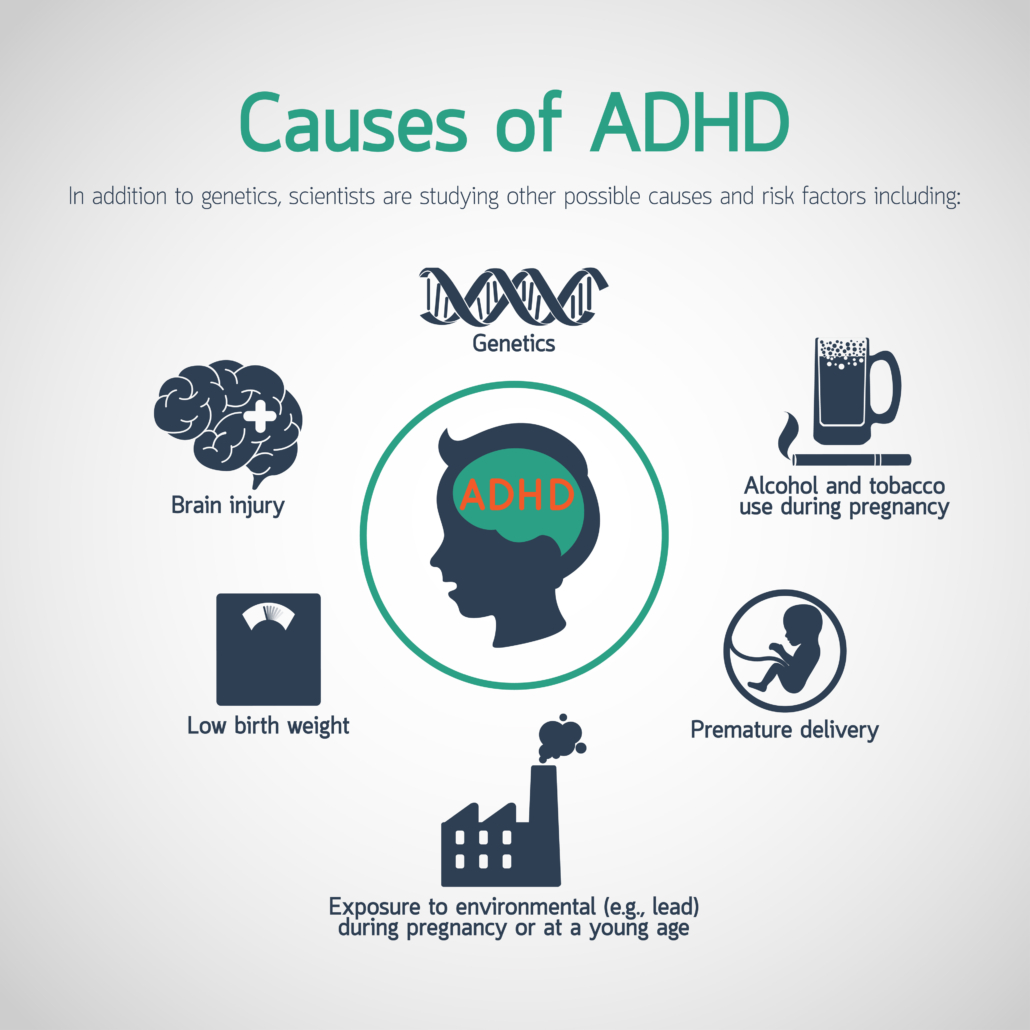
Today’s world is fast-paced and demanding, which makes the ability to concentrate and focus the key to success. But for people with attention deficit hyperactivity disorder (ADHD), this can be a challenge. Thankfully, a ketogenic diet can help.
ADHD impairs attention span, organization skills, and various areas of cognitive function. And it affects people of all ages. Traditional treatments like therapy have been effective, while emerging research on the ketogenic diet for cognitive disorders suggests that it may be a powerful alternative approach.
This makes sense when considering that the ketogenic diet was originally popularized for its effectiveness in treating drug-resistant epilepsy and has been found effective for protecting the brain against cognitive decline. [1] [2] Recent studies have found keto remarkably effective in treating serious psychiatric disorders. [3]
In this blog post, we will explore the connection between the keto diet and ADHD management. We’ll follow the scientific evidence to shed light on the underlying mechanisms and new possibilities for a lifestyle approach to managing this neurodevelopmental disorder.

ADHD stands for Attention Deficit Hyperactivity Disorder. It is a neurodevelopmental disorder that generally begins in childhood. But it can persist into adulthood.
Characteristics of ADHD include patterns of inattention, hyperactivity, and impulsivity. Not surprisingly, these patterns pose extreme challenges to functioning in everyday life, leading to problems with [4]
It is estimated that in America, 9.8% (6 million) children aged 3-17 years old have been diagnosed with ADHD. [5]
Symptoms of ADHD are divided into two main groups–inattention and hyperactivity/impulsivity. [6] [7]


Research has linked ADHD to a number of factors, including

The ketogenic diet is a high-fat, low-carb way of eating. It requires dramatically reducing carbs, increasing fats, and consuming moderate protein.
ketogenic macronutrient ratios look like
When you cut carbs and increase fat, you trigger your liver to increase its metabolization of bodily and dietary fat into energy compounds called ketones.
Ketones provide significant increases in energy per unit, which has been shown to improve the performance of brain cells and related mental functions. [14]

The ability to enter ketosis is part of our evolutionary heritage, and it is safe and sustainable for people consuming a well-formulated high-fat, low-carb diet.
A growing body of evidence supports the view that humans evolved as hypercarnivorous apex predators for nearly 2.5 million years until the dawn of agriculture only 10,000 years ago.1
Eating mostly meat pushed our ancestors to evolve physiology designed to thrive on low carbs and fatty meat. We, modern humans, share this genetic heritage. Our bodies and brains–the most energy-hungry organ in our bodies– can benefit from the way that keto simulates a realignment with ancestral eating patterns.
There are a couple of approaches to ketogenic ancestral eating. The standard keto food pyramid looks like this.

While the above food pyramid can be a good entry point, many people looking to maximize the benefits of low-carb eating practice a carnivore diet.

Though research looking at keto and ADHD is still emerging, there are a number of promising areas to explore.
The ketogenic diet eliminates spikes and dips in blood sugar, which supports the stable energy and associated mental clarity and focus that many people cite as a key benefit of keto. [15]
A 2018 study found that a ketogenic diet could be optimal for enhancing large-scale network function across the brain–a feature that is critical for higher levels of cognition. [16]
Stable energy, increased focus, and improved high-level cognitive function are all particularly beneficial for people with ADHD.
The keto diet positively impacts neurotransmitter activity, particularly dopamine and serotonin. [17] [18]
This impact may support a decrease in hyperactivity and impulsivity commonly associated with ADHD.
Boosting fats and cutting carbs optimizes brain chemistry in ways that can help people with ADHD regulate behavior and control their impulsive actions.
Studies show that keto supports the function of mitochondria in brain cells. Mitochondria are the energy factories within each cell. [19] [20] [21]
This keto-induced change in neurology is likely responsible for the reports of improved mental clarity and heightened mental performance by many keto dieters.
Improving mitochondrial function can enhance cognitive processing, memory, and overall mental functioning in ways that are especially helpful for people with ADHD.
The keto diet helps to balance serotonin levels and stabilize GABA/glutamatergic neurotransmission, which, in turn, may help to stabilize mood and reduce irritability in people with ADHD. [22]
GABA is an inhibitory neurotransmitter, and irregularities in GABA are associated with ADHD, autism, and the severity of ADHD symptoms. [23]
Chronic inflammation has been linked to various neurological conditions, including ADHD. [24]
The ketogenic diet has been shown to provide powerful anti-inflammatory effects. These are produced by dramatically reducing carbs and increasing healthy fats.
The anti-inflammatory effects of keto have been studied as a factor in preventing Alzheimer’s and may help alleviate ADHD symptoms associated with neurological inflammation. [25]
People with ADHD often experience sleep problems, including insomnia, restlessness, and overall poor sleep quality. [26]
Studies show a ketogenic diet balances neurotransmitters, promotes adenosine activity and relaxes the nervous system while simultaneously reducing inflammation and chronic pain. All of these factors can improve sleep quality, leading to better daytime functioning. [27] [28]
These effects can be amplified by combining keto with intermittent fasting or time-restricted feeding. Eating meals only during daylight supports your body’s circadian rhythm–an internal clock that regulates sleep and wake cycles.
Metabolic syndrome and its components, including obesity, type II diabetes, insulin resistance, and leptin resistance, are common among people with ADHD. [29] [30]
Numerous studies show that ketogenic diets are remarkably effective at treating and reversing metabolic syndrome. And that they are far more effective than other dietary interventions, including low-fat and vegetarian diets. [31] [32] [33] [34]
By treating the root hormonal causes of metabolic syndrome and obesity, keto may reduce associated ADHD symptoms.
Practicing a ketogenic diet empowers people to take an active role in managing their health and well-being.
When you make dietary changes and pay close attention to their impact on ADHD symptoms, you can gain a sense of control and autonomy over your ADHD symptoms, which can boost your self-esteem, motivation, and overall quality of life.
Though limited in number, studies on the link between the ketogenic diet and ADHD suggest that keto may offer powerful benefits.
There are also numerous studies showing that keto benefits numerous physiologic and neurological functions associated with ADHD. These include
For these reasons, keto may be an important step for people looking to improve their symptoms of ADHD.



We’re a global community of seekers, healers, and doers committed to reclaiming health on our own terms. When you join the Kiltz Mighty Tribe (KMT), you’ll gain access to education, support, and collective wisdom.


